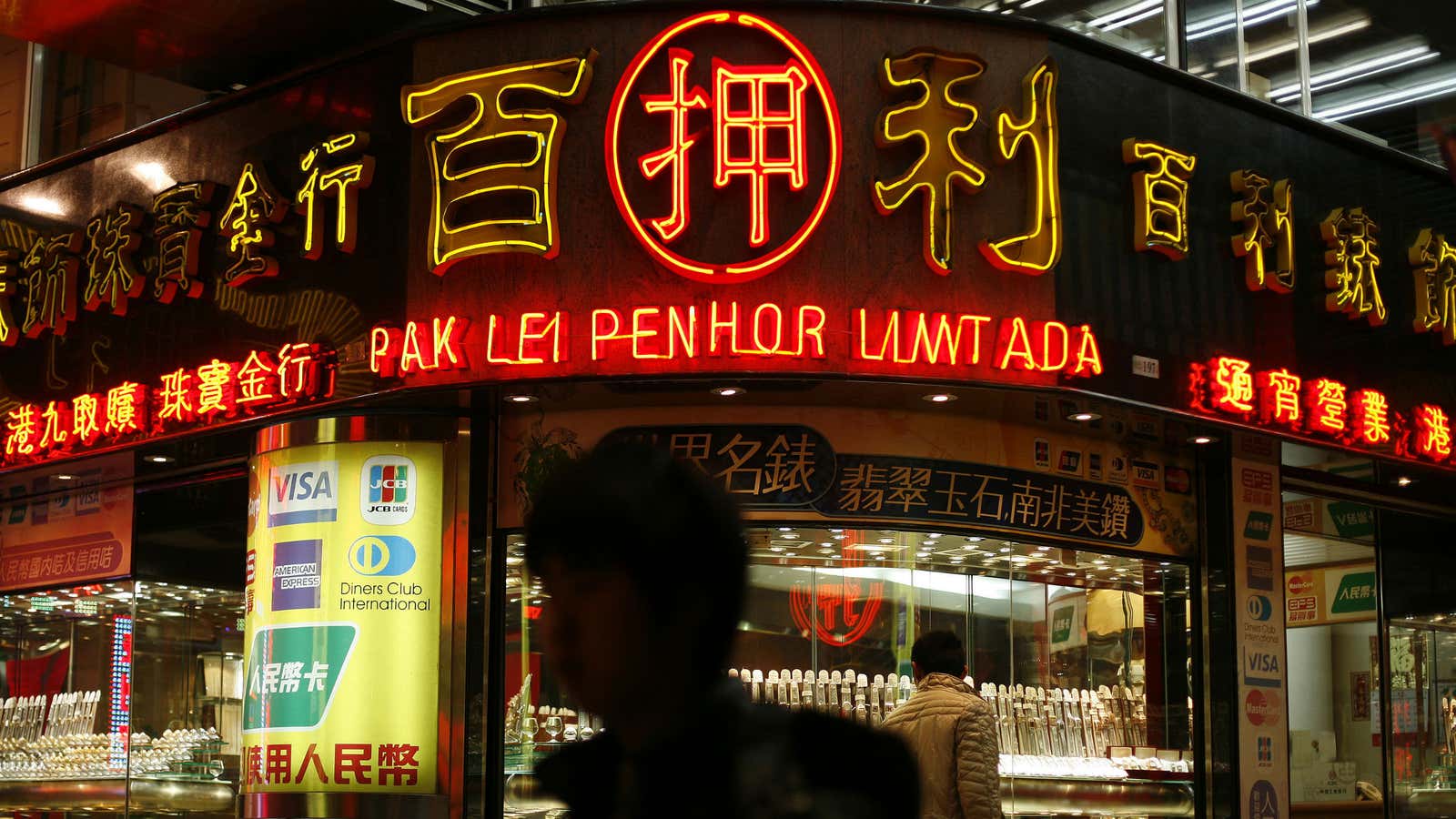Last year, Yang You went to California for the first time. He ate at In-N-Out Burger and admired the redwoods, but what really caught his eye were the trading cards at Gold & Silver Pawnshop. Yang, the director of the board for Huaxia Pawnshop in Beijing, helps oversee high-ticket pawning at one of the oldest, largest and most luxurious pawnshop enterprises in the city. This outfit helps small and medium-sized enterprises (SMEs) realize their “Chinese economic dreams.”
Banned during the more than three decades of communist rule from 1956 to 1987, pawnshops are making a comeback today in China as many SMEs are pawning apartments and cars—even at high interest rates—as they’re finding it difficult to get loans from the banks.
These lenders fall under China’s shadow banking industry, basically any lending agency outside the traditional banking system. In the last four years, bank lending to companies as a share of all liabilities fell from 79% at the end of 2010 to just 57% in June 2013. This reflects not a decrease in need, but an increase in alternative funding routes, such as pawnbrokers.
In 2013, Huaxia Pawnshop opened seven new stores in Beijing. According to Chinese media, there are now 7,000 pawnshops registered nationwide.
At Huaxia, apartments are the most commonly pawned item, luxury vehicles the second, and jade, expensive stones and watches make a close third. Compared to America, where individuals pawning jewelry and electronics worth about $150 are brokers’ most common customers, Huaxia looks more like a luxury department store gleaming with Cartier and rare jade statues.
But behind the glitz, half of Huaxia Pawnshop’s customers are business owners pawning their Beijing apartments. These high-ticket loans invite huge interest rates.
Huaxia charges 3.525% interest per month on property, while the People’s Bank of China charges only about 0.5% interest. Luxury cars and jewelry command almost 5% interest monthly at Huaxia.
But for Chinese SMEs, the issue of access can’t be priced. Banks in China hesitate to offer loans to companies outside state-owned enterprises, and often after issuing loans to local governments and national companies, there’s just no credit left.
EZCORP, one of the United States’ largest pawnshop operators, reported that in November 2013 net revenue was down 7%, while China Daily reported that, during the same period, Chinese pawnbrokers were enjoying more than 23% annual growth.
In Shanghai’s free trade zone, pawnshops are even open to international investment. But what investors would be throwing cash into is uncertain.
“There’s certain risks in regards to the shadow banking industry,” said Ismael Pili, head of financial analytics Asia at Macquarie Group. “1) It’s not well regulated, 2) There’s still opacity with regards to what’s going on and 3) It’s become a sizable portion of the economy.”
So the spirit of unregulated borrowing and lending continues. Today, shadow lending is the fastest-growing part of China’s financial sector, and JP Morgan Chase estimated that it accounted for 69% of China’s GDP—or 36 trillion yuan ($5.9 trillion)—in 2012.
“It’s a conduit for economic growth,” Pili said. “But it’s not very well regulated, and there’s emerging risks.”
In the fall of 2011, for example, dozens of entrepreneurs in Wenzhou fled town to escape creditors despite strong sales. These private business owners faced financial ruin because of their inability to service loans secured by the city’s underground banks. By Oct. 5, the crisis was so severe that then Premier Wen Jiaobao visited the city to discuss ways to prevent the spread of financial instability. Later, it was revealed that 89% of Wenzhou households and 60% of local businesses were involved in shadow lending, according to a survey conducted by the PBoC branch in Wenzhou at the time.
That November the State Council responded by placing pawnshops under the direction of the Ministry of Commerce. The PBoC survey found that people were pawning apartments to play the stock market. That practice was banned in May of that year, although regulations on playing stocks with pawnshop loans remain lax.
Recently, the government has been looking to crackdown on underground lending, with state initiatives that look to clarify the central bank and the banking, securities, and insurance agencies responsibilities in policing shadow banks, and other regulations that limit interbank lending.
“I don’t think there’s going to be a banking crisis because the government will just basically save itself again, as they’ve done over the past several decades. Every decade it seems they come in and bail out the banks,” Pili said.
While shadow lenders do not pose a direct threat to China’s economic system, Pili mentioned that if a large number of pawnshop loans went bad, it could undermine consumer confidence in the traditional banking system. Namely, customers might question banks’ lending authority, find alternative routes for funding, and even lead to the collapse of a bank. Disillusioned and driven by credit, this is how customers swallow the high premiums of a pawnbroker.
